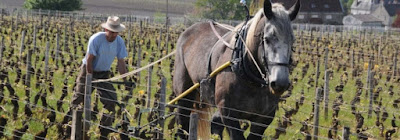 |
| Man, Oronce, you worked your ass off and didn't even score Premier Cru grapes? |
So, OK, village wines: always fun but I expected your weekday, missionary sex anyway, not weekend acrobatics, and I did get that, but high quality stuff, and of a distinctly sweaty and fulfilling sort. And it turns out that Oronce's touch and whole cluster ideology expresses both the vintage and village. Which was definitively expressed in the way the Marsannay flight didn't segue into the Gevrey flight via the Fixin, but rather the wines bitch-slapped each other out of the way, the Marsannays floral as opposed to the typical sauvage of the Gevreys, with the Fixin separating the two distinct facets with its vivid, feminine fruitiness and rotting rose petals.
Macon, Chateau de Berze, 2013
This is Gamay, of course, this being Macon, the lesser known Gamay habitat, and it shows fresh yet brooding berries, a hint of spices, savory yet prominent tannins, and on point acidity. 205 NIS.
Macon, Chateau de Berze, 2012
This is a very joyful, more harmonious wine, fleshier and more detailed, with a very peppery strain. You can see, with this pair, how 2012 has fleshy fruit a la 2009, while 2013's acidity resembles 2008. 200 NIS.
Macon, Chateau de Berze, 2011
At peak, tannins very tame, overshadowed by 2012, even 2013 to a lesser extent, and very similar to them at any rate. 2011 is the most drinkable vintage of the three anyway, likely the most friendliest and earliest drinking since 2000, and, in some ways, it is arguably the shallowest - this being Macon, it is probably at its peak, with this bottle a little past it.
Marsannay, Longeroies, 2013
Marsannay is the most northern village in the Cote d'Or, and Longeroies is a very high vineyard, so that makes for a very floral, elegant wine, with pure, fresh fruit, complicated by a touch of earth, a touch of earth, soft tannins. 285 NIS.
Marsannay, Longeroies, 2012
As with the Macon, 2012 is fleshier, much more concentrated and spicier on the palate and, especially, the nose. The vineyard expresses its signature with a telltale languid freshness that the 2013 also exhibited. 280 NIS.
Fixin, Le Clos, 2013
You could chalk up the differences between the Macon and the Marsannays to the variation in grapes, but here you just have to own it up to terroir. This is the fruitier wine of the evening, but since this is Burgundy, all that means is that there is a languid, delicate sweetness born of fresh fruit, without any harmonic and/or dissonant notes of earth, fur, spices and the like, although there is a pleasant sensation I would term rotting flower leaves - although I wouldn't argue if you wanted to term it tea infusion, we'd sound like pretentious pansies anyway, wouldn't we? 305 NIS.
Gevrey-Chambertin, La Justice, 2013
Gevrey. The "blind tasting" village, the one you're supposed to always spot, because it's got that leathery character the French call sauvage, which isn't easy to translate, so just think horse hide, leather, sweat, the things that make conjure game and hunt. This tasting, of course, wasn't blind, but I think the characteristics I described qare uite self-evident here, in this concentrated, primal, almost liquorish wine. 430 NIS.
Gevrey-Chambertin, La Justice, 2012
This is even more of Gevrey, which is expected, as age usually underlines the characteristics of the terroir. It's stinkier and more concentrated, at the same time the tannins are finer. 420 NIS.
Vosne Romanee, Aux Reas, 2013
"There are (should be) no common wines in Vosne" said no less an authority than Hugh Johnson. And this is no common wine, with a lofty price to boot, opulent and loaded with exotic spices, flavorful and multi-layered on an almost airy frame. 590 NIS.
What's the bottom line? If you want to pursue Gamay, Oronce's version can easily rival, and arguably best, the highest level of quality Beaujolais Cru. If you want the best specimen of Gevrey or Vosne - well, I'm not going to argue that Maison Romane should be your first choice. But if you want to get it on with an artisanal expression of Bourgogne and want to experiment with a personal idiom of overlooked villages such as Marsannay or Fixin, then you've come to the right place (conversely, if you want to focus on the big name villages, I'm not going to argue that either)! And when he can get a hold of the grapes, the man makes a Corton Grand Cru that'll make you loop the loop.
Comments